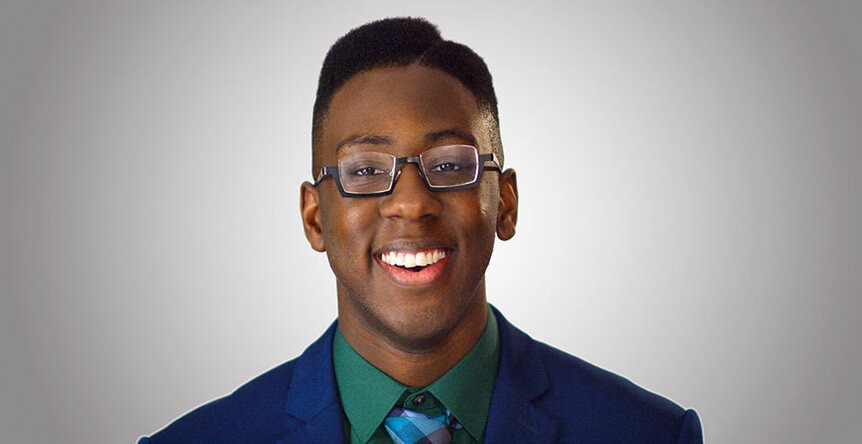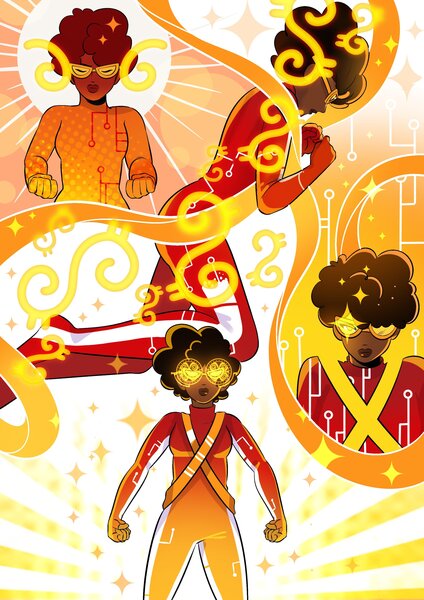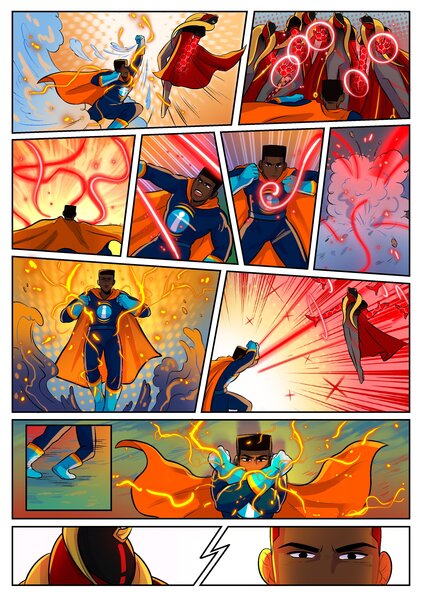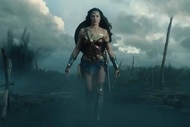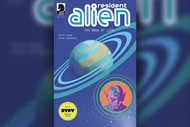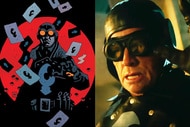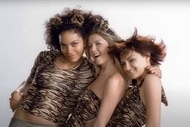Create a free profile to get unlimited access to exclusive videos, sweepstakes, and more!
Blerd Rising Star: Tony Weaver, Jr. is the Weirdo-in-Chief at his own comics company
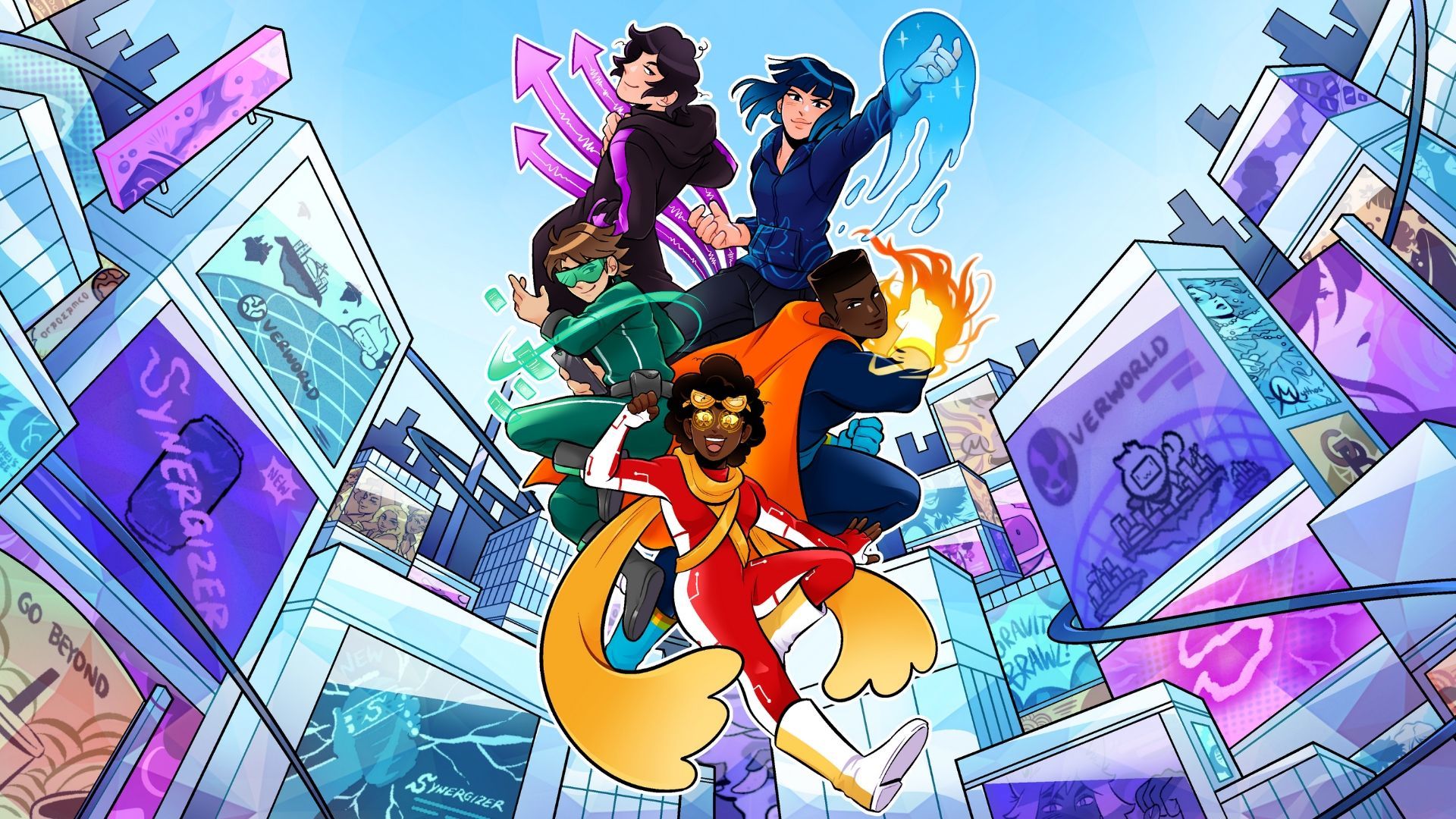
There are plenty of 24-year-olds walking around comic conventions, but Tony Weaver Jr. isn't exactly your normal fanboy. He's the CEO of his own burgeoning comic book company, having built Weird Enough Productions on an $80,000 grant he secured while still in college. He landed a coveted spot on the Forbes 30 Under 30 list and delivered a popular TED talk about tech and education. Facebook, Marriott, and AT&T have given him recognition and support, the latter two providing grant money that allows him to pay his artists and writers more than the industry standard.
It's an incredibly impressive resume already, and while it's taken plenty of work along the way, none of it would have been possible had the Atlanta native not discovered his love for Shonen Jump at a Scholastic book fair. From that point on, he was hooked, not only on anime but brokering business deals to make it a central part of his life. The first deal? Negotiating with his father to start his homework after Yu-Gi-Oh aired on Toonami.
The journey to this point wasn't always as simple as those early negotiations. Weaver is very candid about the emotional issues that came with growing up as a young black nerd, and how it led to bullying, and eventually depression. Daring to be himself led to a lot of early lows but has since informed his work at his company, Weird Enough Productions, "a comic organization using diverse representation to make heroes both on and off the page."
SYFY WIRE sat down with Weaver to talk about Weird Enough, its flagship story The UnCommons, and how he found success is right outside his comfort zone.
Can you tell us a bit about Weird Enough Productions and The UnCommons?
My official job title is Weirdo-In-Chief for Weird Enough Productions. I essentially manage everything, making sure all our pieces are moving properly. Our launch series, The UnCommons, is the tale of five unlikely outsiders that need to save each other to save the world. It centers around Iris, a West African teen who's been gifted with Second Sight, a mystical ability that lets her see energies, details, and outcomes.
Talent-wise, who put this project together?
I originally started writing it with a close friend of mine named Rasheed Cheek. After the first three arcs were plotted, Rasheed left me to continue plotting the rest of the story.
We work with a team of amazing artists from around the world. We have artists from across the United States in New York and Texas and Portland. We also have artists from Ghana, Nigeria, and the Philippines. It's literally an international piece. Anytime you look at the UnCommons it's a collaboration of a group of artists that are just as diverse as the stories that they want to make and write.
Where did your Blerdom start?
As a kid, I just fell into all that nerdy stuff, like my kid. My mother was an educator and was big on me reading when I was younger. She'd take me to the library, and I would organically self-assign myself to the Manga section. I didn't [realize that's what I was looking at], it just felt right.
So how does this early passion shape the moves you've made with your company thus far?
I like to say I've spent my entire life preparing for this. Every experience I've had has led me to a place to do what I currently do. While I was double-majoring in acting and communications at Elon University in North Carolina, I served as a volunteer at an elementary school. One of my mentees was a fourth grader named Nazir, a young black kid who loved and only wanted to talk about cartoons but had no one his age to talk about them with.
There were so many similarities between us. Halloween was coming up, and I asked him if he was going to be dressing as his favorite hero. He told me he couldn't because he didn't look like his favorite hero. So he opted to go as C.J. from Grand Theft Auto instead. I get a laugh out of that sometimes when I tell that story. But for me, I saw this fourth grader and realized something was wrong. He wasn't seeing the potential that he was capable of. It made me think about when I was younger.
How so?
I lacked the ability to see that potential as well. I got bullied a lot at his age. Moved around from school to school, so I was the new kid every year. It was difficult enough for me to make friends as it was. I thought there must be something wrong with me. I'm into this stuff and nobody else seems to be. My thought obviously was that I wasn't into the things that I was supposed to be into. It got so bad that in middle school I dealt with depression and I attempted to take my own life because I didn't feel like who I was as a person had value. I got therapy — shout out to therapy.
But you saw yourself in Nazir at that moment.
Exactly. I wanted to build something that could positively represent. I think that as artists and writers we can overstate that impact of representation alone. There are people that legitimately believe if I write a comic that has a black character, all I needed to do is put that out into the ether. And then suddenly the world is just going to change. Because this one kid saw this one black character in one 22-page comic. I knew that that wasn't how it worked. I had to answer the question of what sustainable impact looks like for representation. How can you chart out that impact and show it? I started doing a bunch of research.
Milestone was a company with a similar goal of representation and inclusion. Did you look into them during your research?
I remember looking up information about Milestone in high school and feeling really inspired. I was, of course, a huge fan of Static Shock. A couple of years ago I actually had the opportunity to meet Derek T. Dingle from the original Milestone crew. We had amazing conversations about comics. I love what they did, but I don't like how the industry treated them.
If there's anything that I learned from Milestone it's that the industry at large has the potential to be very vicious. It can take kindhearted people with the most amazing intentions and chew them up. We wanted to take the heart of what creatively they were doing while being aware of how things ended for them. Asking how we can position ourselves as a business to make sure that we're sustainable.
Where else did your research take you?
I got a research grant from my university to study media representation. I spent a semester in Japan researching storytelling techniques. Moved on to an internship at NBC. And right before I graduated from college I found out that we were getting an $80,000 grant from an organization called the Echoing Green Foundation. I joke that the leaders of tomorrow are also the crazy people of today. Echoing Green looked at my crazy and essentially said, "Hey, it's kinda dope. We like it. Let's cut him a check."
So what's the model for sustainability for Weird Enough?
We put the comic out online for free and also launched a print version of the comic for the first time. We partner it with programs and curricula that are used in schools, libraries, and afterschool programs around the country for things like literacy, social-emotional learning, and digital citizenship.
We'd be remiss if I didn't ask you about your TED talk from 2018.
It changed the trajectory for our work in a lot of ways. The TED talk was a conversation I would have with people in person all the time. All the emails and messages that I've gotten from teachers playing it in their class let me know that in order to positively change the world we have to be courageous and embrace our truth. It's ironic that the plot of out comic ties into that lesson as well.
What are your plans for Weird Enough moving forward?
You always have to have a plan, you can stumble into a lot of places, but it's very difficult to stumble into the success. When I think of Weird Enough's future, I think that everything that we're doing today is directly in line with what we're planning for the next five to ten years. Our artists are amazing. The team and the editors I get to work with are amazing. Right now our focus is really on The UnCommons and making sure that we get it into the hands of as many young people as possible.
